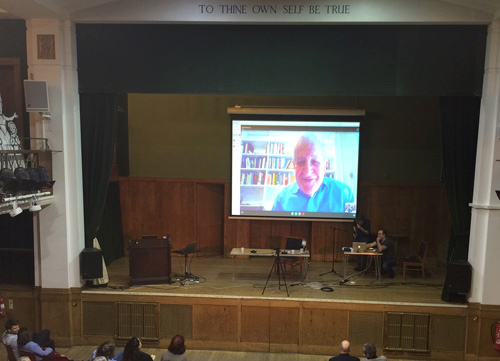Noam Chomsky on Institutional Stupidity
In January Noam Chomsky received the Philosophy Now Award for fighting stupidity.

The award
Rick Lewis’s Introduction:
Welcome to the 4th Philosophy Now Award for Contributions in the Fight Against Stupidity. I’m delighted to say that we’re giving this year’s award to Professor Noam Chomsky.
Stupidity comes in many forms. Generally it is easier to spot when other people are being stupid and harder to notice when we ourselves are being stupid, in the sense of relying on unexamined assumptions, entrenched mental habits or poor reasoning. Yet we’re all guilty of these sometimes. Trying not to fool ourselves in these ways is central to philosophy.
So how can Chomsky help us with this? One of the world’s best-known intellectuals, he first gained fame for his work as a linguist, and in particular for his theory that we have an in-born or ‘innate’ grammar that underlies all of the world’s natural languages. He has gone on to do important original work on many other topics, including machine translation, logic, philosophy, and the nature of the media. A tireless social commentator, he also does a great deal of highly controversial political activism.
We want to give the Against Stupidity Award to Noam Chomsky not for his activism, for Philosophy Now does not take positions on political issues, nor for his fascinating early work on innate grammar, but mainly for his work on the structure of the media, and for his continual incitement to independent critical thinking. In their 1988 book Manufacturing Consent, Chomsky and his co-author Edward S. Herman examined various institutional biases that affect the media worldwide. Chomsky followed this up with related work such as his 1991 book Media Control: The Spectacular Achievements of Propaganda.
Immanuel Kant said our experiences depend not only on the nature of the external world but also on our perceptual apparatus and our mental categories. There is the phenomenal world, the world as we experience it, and there is the noumenal world, the external world as it actually is, which we can never fully know.
Chomsky’s project is in some ways reminiscent of Kant’s. It examines how we gain knowledge of the social and political worlds. The world is very big, so you can’t be an eyewitness to most of what goes on in it and instead have to find out about it through intermediaries, in digested form. It’s because they are intermediaries that we call them the media. But in reporting the news they first have to decide what is newsworthy, and how to report it. In authoritarian countries this process is subject to censorship that is often obvious and sometimes brutal. Chomsky argues that news reporting is shaped by powerful interests in capitalist democracies too, though in ways that are far less apparent. In Manufacturing Consent, Chomsky and Herman argue that the selection and presentation of news in the West is subject to five ‘filters’. The first is ownership (the giant conglomerates that now own much of the world’s media have wide commercial interests and tend to discourage reporting that will undermine those interests). Secondly, they rely on selling advertising, and will tend to exclude reporting which conflicts with the ‘buying mood’. Thirdly, given finite editorial resources they all rely on news stories from outside organisations including the press departments of government and commercial bodies, and are often unwilling to alienate those sources. Fourthly they are constrained by the desire to avoid ‘flak’, in other words hostile reactions to news stories. Fifthly, they operate under ideological constraints – in the past, anti-communism, and now the war against terror. Chomsky and Herman also present statistical analysis of the reporting of different kinds of stories, to test the validity of their model. If we take the news we read at face value without considering the forces that shape it, we may be fooling ourselves. If we understand those mechanisms, then we can also take them into account and maybe gain a clearer understanding of the world itself.
Chomsky as a social critic constantly questions public policy and the presentation of the news. He asks hard questions and even when you disagree with him, forces you to justify your thinking about society and values. For these reasons he is a very worthy winner of this year’s award.

Chomsky appeared at the Philosophy Now award ceremony at London’s Conway Hall via a live video link from his home in Massachusetts
Noam Chomsky’s Response:
Naturally I am very pleased to be granted this honour, and to be able to accept this award also in the name of my colleague Edward Herman, the co-author of Manufacturing Consent , who himself has done a great deal of outstanding work on this crucial topic. Of course, we’re not the first people to have addressed it.
Predictably, one of the earlier ones was George Orwell. He’s written a not very well known essay that is the introduction of his famous book Animal Farm . It’s not known because it wasn’t published – it was found decades later in his unpublished papers, but it is now available. In this essay he points out that Animal Farm is obviously a satire on the totalitarian enemy; but he urges people in free England to not feel too self-righteous about that, because as he puts it, in England, unpopular ideas can be suppressed without the use of force. He goes on to give examples of what he means, and only a few sentences of explanation, but I think they’re to the point.
One reason, he says, is that the press is owned by wealthy men who have every interest in not having certain ideas expressed. His second is a interesting point, that we didn’t go into but should have: a good education. If you go to the best schools you have instilled into you the understanding that there are certain things it just wouldn’t do to say. That, Orwell claims, is a powerful hook that goes well beyond the influence of the media.
Stupidity comes in many forms. I’d like to say a few words on one particular form that I think may be the most troubling of all. We might call it ‘institutional stupidity’. It’s a kind of stupidity that’s entirely rational within the framework within which it operates: but the framework itself ranges from grotesque to virtual insanity.
Instead of trying to explain it, it may be more helpful to mention a couple of examples to illustrate what I mean. Thirty years ago, in the early eighties – the early Reagan years – I wrote an article called ‘The Rationality of Collective Suicide’. It was concerned with nuclear strategy, and was about how perfectly intelligent people were designing a course of collective suicide in ways that were reasonable within their framework of geostrategic analysis.
I did not know at the time quite how bad the situation was. We have learnt a lot since. For instance, a recent issue of The Bulletin of Atomic Scientists presents a study of false alarms from the automatic detection systems the US and others use to detect incoming missile attacks and other threats that could be perceived as nuclear attack. The study ran from 1977 to 1983, and it estimates that during this period there were a minimum of about 50 such false alarms, and a maximum of about 255. These were alarms aborted by human intervention, preventing disaster by a matter of a few minutes.
It’s plausible to assume that nothing substantial has changed since then. But it actually gets much worse – which I also did not understand at the time of writing the book.
In 1983, at about the time I was writing it, there was a major war scare. This was in part due to what George Kennan, the eminent diplomat, at the time called “the unfailing characteristics of the march towards war – that, and nothing else.” It was initiated by programs the Reagan administration undertook as soon as Reagan came into office. They were interested in probing Russian defences, so they simulated air and naval attacks on Russia.
This was a time of great tension. US Pershing missiles had been installed in Western Europe, with a flight time of about five to ten minutes to Moscow. Reagan also announced his ‘Star Wars’ program, understood by strategists on both sides to be a first strike weapon. In 1983, Operation Able Archer included a practice that “took Nato forces through a full-scale simulated release of nuclear weapons.” The KGB, we have learnt from recent archival material, concluded that armed American forces had been placed on alert, and might even have begun the countdown to war.
The world has not quite reached the edge of the nuclear abyss; but during 1983, it had, without realizing it, come frighteningly close – certainly closer than at any time since the Cuban Missile Crisis of 1962. The Russian leadership believed that the US was preparing a first strike, and might well have launched a preemptive strike. I am actually quoting from a recent US high-level intelligence analysis, which concludes that the war scare was for real. The analysis points out that in the background was the Russians’ enduring memory of Operation Barbarossa, the German code-name for Hitler’s 1941 attack on the Soviet Union, which was the worst military disaster in Russian history, and came very close to destroying the country. The US analysis says that was exactly what the Russians were comparing the situation to.
That’s bad enough, but it gets still worse. About a year ago we learned that right in the midst of these world-threatening developments, Russia’s early-warning system – similar to the West’s, but much more inefficient – detected an incoming missile strike from the US and sent off the highest-level alert. The protocol for the Soviet military was to retaliate with a nuclear strike. But the order has to pass through a human being. The duty officer, a man named Stanislav Petrov, decided to disobey orders and not to report the warning to his superiors. He received an official reprimand. But thanks to his dereliction of duty, we’re now alive to talk about it.
We know of a huge number of false alarms on the US side. The Soviet systems were far worse. Now nuclear systems are being modernised.
The Bulletin of Atomic Scientists have a famous Doomsday Clock, and they recently advanced it two minutes. They explain that the clock “ticks now at three minutes to midnight because international leaders are failing to perform their most important duty, ensuring and preserving the health and vitality of human civilisation.”
Individually, these international leaders are certainly not stupid. However, in their institutional capacity their stupidity is lethal in its implications. Looking over the record since the first – and so far only – atomic attack, it’s a miracle that we’ve escaped.
Nuclear destruction is one of the two major threats to survival, and a very real one. The second, of course, is environmental catastrophe.
There’s a well-known professional services group at PricewaterhouseCoopers who have just released their annual study of the priorities of CEOs. At the top of the list is over-regulation . The report says that climate change did not make it into the top nineteen. Again, the CEOs are doubtless not stupid individuals. Presumably they run their businesses intelligently. But the institutional stupidity is colossal, literally life-threatening for the species.
Individual stupidity can be remedied, but institutional stupidity is much more resistant to change. At this stage of human society, it truly endangers our survival. That’s why I think institutional stupidity should be a prime concern.
Thank you.
(Philosophy Now : https://philosophynow.org/issues/107/Noam_Chomsky_on_Institutional_Stupidity)







